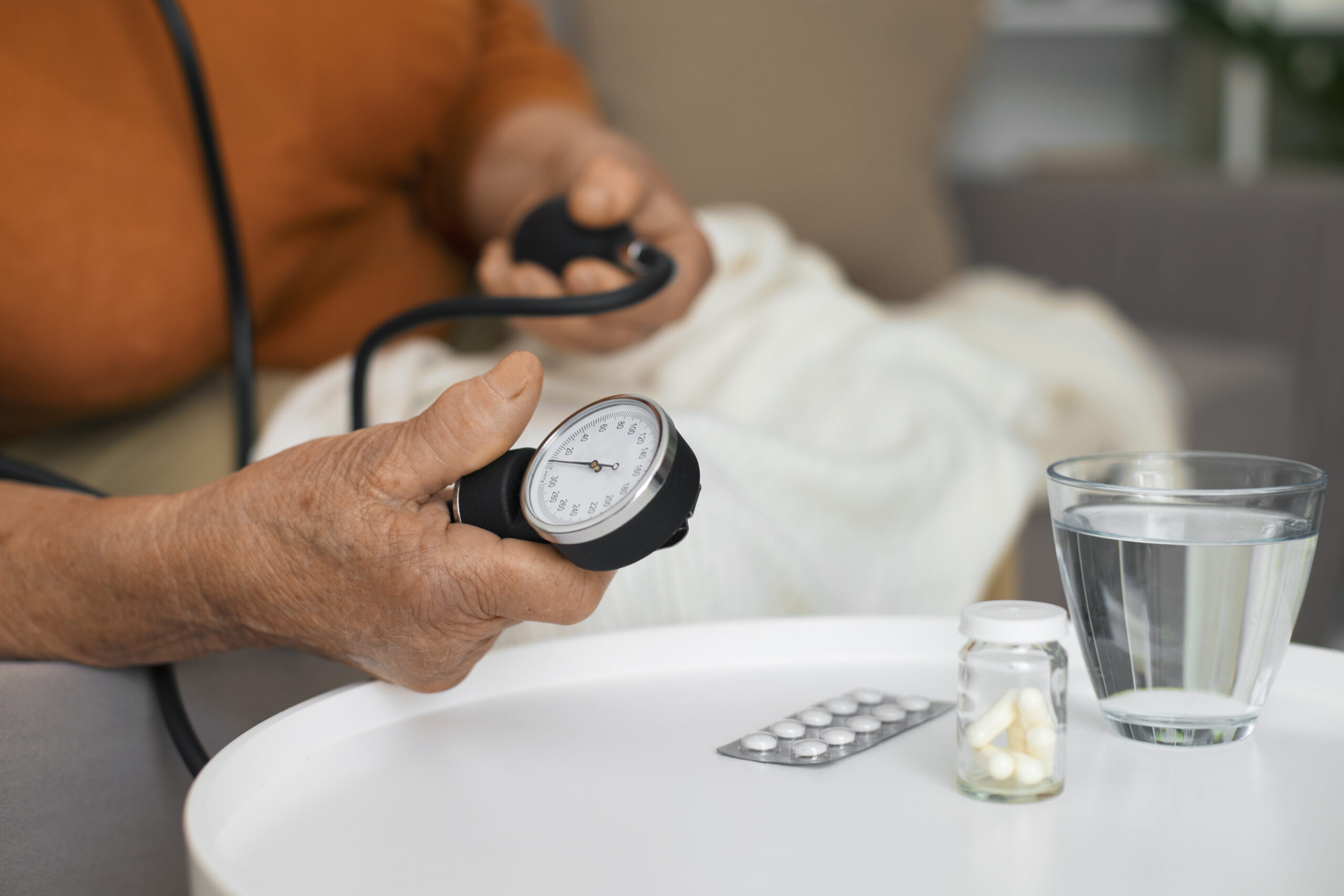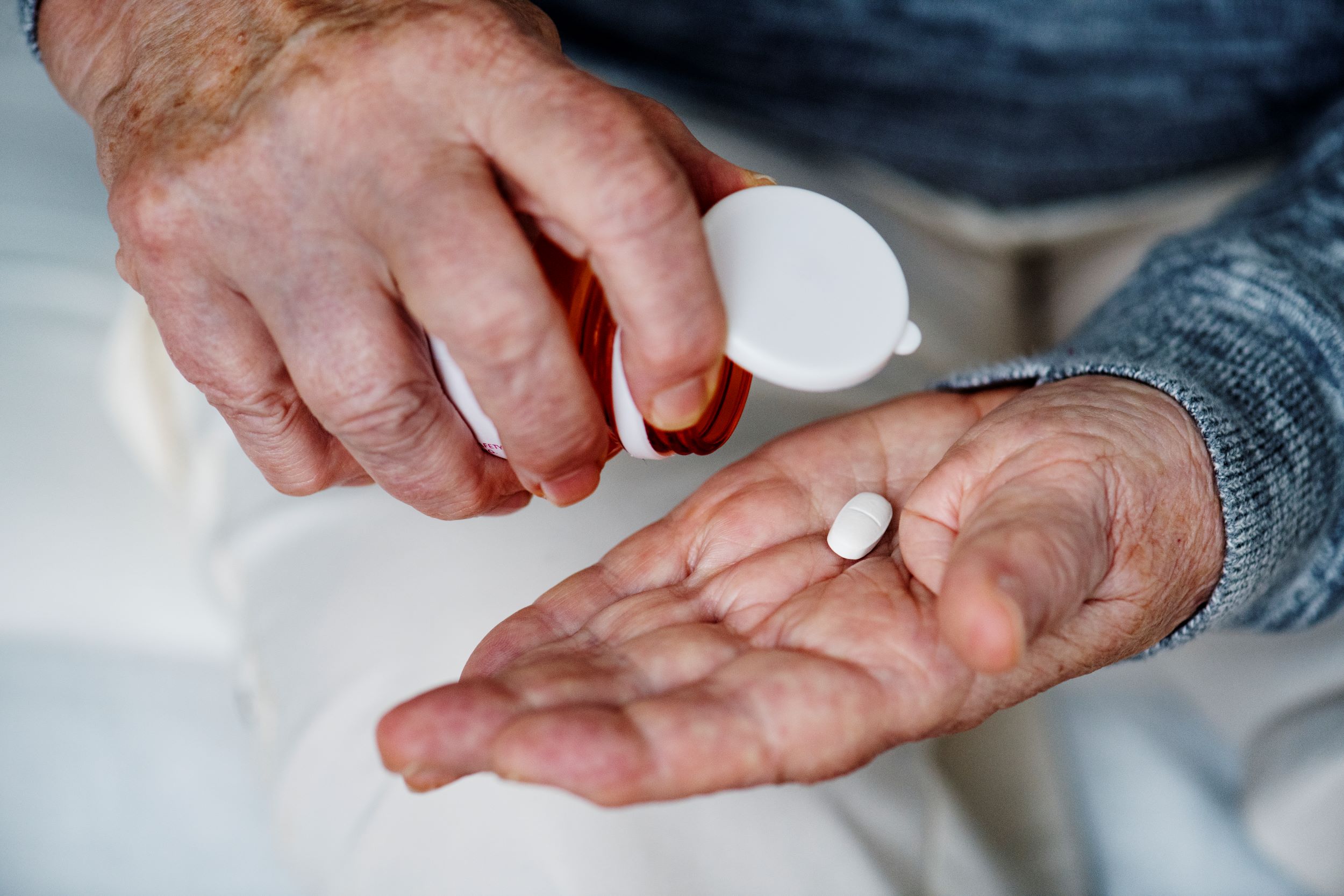Browse
Hypertension (High blood pressure) is a condition in which the body’s blood pressure is constantly elevated.
Untreated hypertension can lead to many dangerous conditions such as a heart attack, chronic kidney disease, a stroke or heart failure.
At Meds for Less, we sell a range of hypertension medications such as Atenolol, Bisoprolol Fumarate, Candesartan or Enalapril. Each medication has different mechanisms of actions and different presenting conditions in patients warrant the use of different drugs.
Check out our Full Catalogue of Hypertension medications at thr Meds For Less website and order safely, conveniently and reliably for next day delivery to your home address.
High blood pressure (Hypertension) is consistently elevated blood pressure in the arteries.
Blood pressure is measured in millimetres of mercury (mm Hg) and has two recorded measurements.
Systolic Blood pressure is normally 120 mm Hg and Diastolic Blood pressure is normally 80 mm Hg.
Please see the table below for Systolic and Diastolic Blood pressure values normally and at different stages of hypertension.
| Stage | Systolic Blood Pressure | Diastolic Blood Pressure |
| Normal | Less than 120 mmHg | Less than 80 mmHg |
| Prehypertension | 120-129 mmHg | Less than 80 mmHg |
| Hypertension stage 1 | 130-139 mmHg | 80-89 mmHg |
| Hypertension stage 2 | Higher than 140 mmHg | Higher than 90 mmHg |
| Hypertensive crisis | Higher than 180 mm Hg | Higher than 120 mm Hg |
These are statistically standard figures when it comes to blood pressure, please be aware that each person’s normal blood pressure levels vary and can be different. Please speak to your doctor about your blood pressure values and what they mean for you.
Hypertension can have many causes, and it can be divided into two categories: primary (idiopathic) hypertension or secondary hypertension.
Primary hypertension is the most common type of hypertension and occurs gradually over many years. There is no single causative factor for this type of hypertension, however there are several risk factors including:
o Lack of physical activity
o Poor diet
o Being overweight or obese
o Smoking
o Excess alcohol intake
o Chronic stress
Secondary hypertension is caused by some other underlying medical condition or the side effect of some medication. Common causes of secondary hypertension include:
Other factors can contribute to the development of hypertension such as:
Hypertension can often go unnoticed until it reaches a life-threatening stage. Symptoms don’t normally appear but if they do, this can indicate dangerously high blood pressure or complications of hypertension.
Common symptoms of hypertensions include:
Symptoms of a hypertensive crisis (when systolic blood pressure exceeds 180 mmHg and diastolic blood pressure exceeds 120 mmHg) include:
A hypertensive crisis can be a life-threatening leading to issues such as a heart attack, stroke or organ damage.
Some complications of hypertension include:
High blood pressure medications are used to reduce blood pressure down to what’s normal for each person.
There are many categories of hypertension medication such as:
Diuretics – These helps eliminate extra water (fluid) from the body and reduce blood volume and pressure.
ACE (Angiotensin Converting Enzymes) Inhibitors – ACE inhibitors block the production of angiotensin II, a hormone that usually narrows the diameter of blood vessels and raises blood pressure.
ARBs (Angiotensin Receptor Blockers) – Block the binding of Angiotensin II to blood vessels and prevents the hormone from causing the narrowing of the blood vessels and raising blood pressure
CCB’s (Calcium Channel Blockers) – These drugs prevent calcium from entering the muscle cells of the heart or blood vessels and cause these muscles to relax allowing the lowering of blood pressure.
Beta Blockers – These drugs reduce the stress and workload of the heart and allow it to beat slower and more lightly, hence reducing the pressure of the blood being pushed through the body’s blood vessels and lowering blood pressure.
Managing hypertension requires the right high blood pressure medication to control blood flow and reduce strain on the heart. Antihypertensive medication works by relaxing blood vessels, reducing fluid retention, or slowing heart rate to lower blood pressure effectively. There are several medications to treat high blood pressure, including ACE inhibitors, beta-blockers, calcium channel blockers, and diuretics, each targeting different mechanisms to maintain healthy circulation.
For those needing ongoing treatment, prescription blood pressure medication should be taken as directed to prevent complications such as heart disease or stroke. Consulting a healthcare provider ensures the right medication to treat hypertension is selected based on individual health conditions and risk factors.
Hypertension is a major public health issue in the UK with around 1 in 3 estimated to have hypertension.
Nearly 5 million out of the 14.4 million people living hypertension are undiagnosed and often have no symptoms
Age increases the risk of hypertension with 31% of men and 26% of women between ages 40-59 having hypertension. In people aged 60-79, the rates of hypertension rise to 63% in men and 67% in women.
There are two main types of hypertension:
Primary hypertension: The most common type of hypertension (found in 90-95% of cases), It has no identifiable cause and develops gradually over time.
There are several risk factors for primary hypertension including:
Secondary hypertension: This type of hypertension is caused by an underlying medical condition or as the side effect of taking a medication. It usually resolves when the cause is addressed.
Possible causes of secondary hypertension can include:
Hypertension can be diagnosed from two separate blood pressure readings of 130/80 mmHg (Systolic/Diastolic Blood pressure).
Doctors typically use a manual or digital sphygmomanometer to measure levels and assess cardiovascular risk. If readings remain elevated, further tests may be required to determine the need for high blood pressure medication or lifestyle adjustments. Early diagnosis allows for timely intervention with hypertension medication to prevent complications such as heart disease or stroke. Regular monitoring is essential for patients prescribed medication to reduce blood pressure, ensuring effective long-term management.
Not all hypertension medication works the same way for every patient. Some people may respond better to medication to reduce blood pressure that targets fluid retention, while others may require vasodilators to relax blood vessels. The choice of medication for hypertension patients depends on factors like age, overall health, and existing conditions such as diabetes or kidney disease.
When purchasing blood pressure medication online, it’s crucial to select trusted brands and follow medical guidance. If lifestyle changes alone are not enough, doctors may prescribe a combination of medications used for hypertension to achieve optimal results. Regular monitoring and adjustments ensure the treatment remains effective in preventing complications.
You can easily and simply finding the cost of blood pressure medication online at our website: Meds for Less.
You can safely, reliably and conveniently order medication from our website for next day delivery to your home address.
Blood pressure medications cannot be bought over the counter in the UK, and they require prescriptions from a healthcare provider. This is because blood pressure drugs require careful choosing, management and adjustment.
There are different classes of blood pressure medications such as ACE inhibitors, ARB’s, Calcium channel blockers or diuretics.
Each medication is used for different reasons and the choice of drug depends on a patient’s health and how they respond to treatment.
Once you start taking blood pressure medications, regular checkups will be required to monitor the dose, see how you are responding and watch out for any side effects.
There is no “best” medication to reduce blood pressure as the choice of antihypertensive medication depends on your individual circumstances and factors such as the cause of your hypertension, your age, sex, ethnicity, other medical conditions and how you respond to the blood pressure drugs.
Please speak to your healthcare provider about which specific blood pressure medication would be best suited to your specific circumstances.
The cost of medication to treat hypertension varies on several factors such as:
Please see our website at Meds for Less for the different blood pressure medications we have and their different costs.
Unfortunately, you cannot prescribe yourself medication used for hypertension as blood pressure medications need to be carefully chosen for each patient and their effects need to be monitored through regular check-ups.
Please speak to a healthcare provider about your blood pressure management and which prescription blood pressure medication is right for you.
A dangerously low blood pressure occurs when systolic blood pressure (the top number) falls below 90 mmHg and diastolic blood pressure (the bottom number falls below 60 mmHg.
Dangerously low blood pressure can occur due to conditions like extreme dehydration, heart problems, severe infections and sepsis, endocrine issues such as low thyroid or Addison’s disease, overuse of antihypertension medications or an anaphylactic shock.
Dangerously low blood pressure can lead to severe conditions such as putting vital organs at risk, due to not being able to supply enough blood to them and potentially causing them to fail.
Some symptoms of dangerously low blood pressure include:
o Dizziness or feeling lightheaded
o Fainting
o Blurred vision
o Nausea or Vomiting
o Confusion
o Fatigue
o Shallow rapid breathing
o Cold, clammy skin
There is no fixed drug of choice for high BP.
Each patient is different and when a healthcare provider is choosing the medication for hypertension patient, the choice is made on the basis of several factors such as patient’s age, sex, ethnicity, how patients would respond to the medication, risk of side-effects and the patient’s individual health status.
Fast, Discreet, and Convenient
We're here to support :)
We are available Monday through Friday from 9am to 4pm. Do not use this service if you need urgent assistance. You should call 111 or 999 in an emergency. See our help section for more information.
Payment Options




| Cookie | Duration | Description |
|---|---|---|
| cookielawinfo-checkbox-analytics | 11 months | This cookie is set by GDPR Cookie Consent plugin. The cookie is used to store the user consent for the cookies in the category "Analytics". |
| cookielawinfo-checkbox-functional | 11 months | The cookie is set by GDPR cookie consent to record the user consent for the cookies in the category "Functional". |
| cookielawinfo-checkbox-necessary | 11 months | This cookie is set by GDPR Cookie Consent plugin. The cookies is used to store the user consent for the cookies in the category "Necessary". |
| cookielawinfo-checkbox-others | 11 months | This cookie is set by GDPR Cookie Consent plugin. The cookie is used to store the user consent for the cookies in the category "Other. |
| cookielawinfo-checkbox-performance | 11 months | This cookie is set by GDPR Cookie Consent plugin. The cookie is used to store the user consent for the cookies in the category "Performance". |
| viewed_cookie_policy | 11 months | The cookie is set by the GDPR Cookie Consent plugin and is used to store whether or not user has consented to the use of cookies. It does not store any personal data. |